(They looked them over carefully.)look upsearch in a listYou've misspelled this word again. She picked out the guy she thought had stolen her purse.pick uplift something off something elseThe crane picked up the entire house. (Watch them pick it up.)point outcall attention toAs we drove through Paris, Francoise pointed out the major historical sites.put awaysave or storeWe put away money for our retirement. She put away the cereal boxes.put offpostponeWe asked the boss to put off the meeting until tomorrow. (Please put it off for another day.)put onput clothing on the bodyI put on a sweater and a jacket.
(I put them on quickly.)put outextinguishThe firefighters put out the house fire before it could spread. She set it up.take downmake a written noteThese are your instructions. Write them down before you forget.take offremove clothingIt was so hot that I had to take off my shirt.talk overdiscussWe have serious problems here. Let's talk them over like adults.throw awaydiscardThat's a lot of money! Verb + preposition When the element is a preposition, it is the head of a full prepositional phrase and the phrasal verb is thus prepositional. These phrasal verbs can also be thought of as transitive and non-separable; the complement follows the phrasal verb.a.
– after is a preposition that introduces the prepositional phrase after the kids.b. – on is a preposition that introduces the prepositional phrase on nobody.c. – into is a preposition that introduces the prepositional phrase into an old friend.d. – after is a preposition that introduces the prepositional phrase after her mother.e. – for is a preposition that introduces the prepositional phrase for a linguist.f. These verbs can be transitive or intransitive.
If they are transitive, they are separable.a. – in is a particle, not a preposition.Verb + particle + preposition (particle-prepositional verbs)Many phrasal verbs combine a particle and a preposition. Just as for prepositional verbs, particle-prepositional verbs are not separable.a. – up is a particle and with is a preposition.b.
– forward is a particle and to is a preposition.c. The other tanks were bearing down on my Panther. – down is a particle and on is a preposition.d.
They were really teeing off on me. – off is a particle and on is a preposition.e. – up is a particle and on is a prepositionf. Susan has been sitting in for me. – in is a particle and for is a preposition. You probably use phrasal verbs, or verbs made of two to three words, every day and don't even realize it. Phrasal verbs can't be translated literally, so you have to learn them by definitions and examples.
A complete phrasal verb list in English would include hundreds of phrasal verbs, but these examples can help you understand this part of speech. Click here for a list of 15 intransitive phrasal verbs with example sentences. The terminology of phrasal verbs is inconsistent. Modern theories of syntax tend to use the term phrasal verb to denote particle verbs only; they do not view prepositional verbs as phrasal verbs. In contrast, literature in English as a second or foreign language ESL/EFL, tends to employ the term phrasal verb to encompass both prepositional and particle verbs. Be consistent and systematic – as with anything else you want to teach, you cannot expect students to learn something the first time you teach it.
Try to include phrasal verbs, either formally or informally, in every lesson you teach. As the saying goes, practice makes perfect. Particle-verb compounds in English are of ancient development, and are common to all Germanic languages, as well as to Indo-European languages in general.
Those such as onset tend to retain older uses of the particles; in Old English on/an had a wider domain, which included areas now covered by at and in in English. Some such compound nouns have a corresponding phrasal verb but some do not, partly because of historical developments. The modern English verb+particle complex set on exists, but it means "start to attack" . Verb-particle compounds are a more modern development in English, and focus more on the action expressed by the compound. That is to say, they are more overtly verbal.
A complex aspect of phrasal verbs concerns the distinction between prepositional verbs and particle verbs that are transitive . Particle verbs that are transitive allow some variability in word order, depending on the relative weight of the constituents involved. Shifting often occurs when the object is very light, e.g. Phrasal verb.2 When he heard the crash, he looked up. Not a phrasal verb.2 When he heard the crash, he looked up at the sky. Not a phrasal verb.The terminology used to denote the particle is also inconsistent.
Sometimes it is called an adverb and at other times an intransitive prepositional phrase. The inconsistent use of terminology in these areas is a source of confusion over what qualifies as a phrasal verb and the status of the particle or a preposition. For many students, one of the most difficult parts of learning English is studying phrasal verbs. A phrasal verb is a verb that is combined with an adverb or preposition. The combination creates a new meaning, often one that is not related to the definition of the base verb and is difficult to guess. Phrasal verbs in English are transitive or intransitive.
The transitive phrasal verbs can be separable or inseparable, but the Intransitive phrasal verbs cannot be separated. Some phrasal verb meanings are obvious—like "fall down"—but some are almost like idioms since they can't be literally translated. To make them easier to learn, you can try grouping the phrasal verbs into categories, like we've done with our phrasal verbs list below. Add up Make sense Her evidence just doesn't add up. A Ask after Inquire about Jim was asking after you Back down Yield in an argument Sheila was right, so Paul had to back down. B Bargain for Take into account We hadn't bargained for there being so much traffic, and we missed the plane.
Bear out Confirm the truth Helen's alibi was borne out by her sister. Break down Lose control of the emotions David broke down and wept when he heard the news. Break off Stop talking He broke off to answer the phone Break up Come to an end The party finally broke up at 3.00am.
Bring on Cause the onset of an illness Sitting in the damp brought on his rheumatism. Bring on/upon Cause trouble to happen to oneself You have brought this on/upon yourself! Bring around Influence someone to your point of view After much discussion, I brought the committee round to my point of view. Bring up Mention I feel I ought to bring up another small matter. Call up Mobilise for military service Mark was called up when the war broke up. C Carry off Complete successfully – perhaps despite a problem Jane had a difficult role to play, but she carried it off.
Carry out Complete a plan The attack was successfully carried out Catch on Become popular – colloquial This new hairstyle is beginning to catch on. Come about Happen Let me explain how the situation came about. Come down to Be in the end, a matter of It all comes down to whether you are prepared to accept less money. Come in for Receive – especially criticism, blame The government has come in for a lot of criticism over the decision.
Come off Take place successfully I'm afraid that deal didn't come off after all. Come out Appear All the flowers have come out.When the news came out, everyone was shocked. The fact is that memorising the various meanings that particles can assume can prove to be as time consuming and ineffective as trying to memorise the meanings of phrasal verbs. The word parts of transitive phrasal verbs either can be separated, that is the particle can be separated from the verb by the direct object, or cannot be separated. Remember that phrasal verbs can be either separable or inseparable .
Each phrasal verb is also marked as separable or inseparable . In the case that verbs are separable, examples will use the separable form of the phrasal verb. For inseparable phrasal verbs, examples keep the phrasal verbs together. Click here for a list of 15 inseparable phrasal verbs with example sentences. The Oxford dictionary, defines phrasal verbs as a verb that is made up of a main verb together with an adverb or a preposition or both. Typically, their meaning is not obvious from the meanings of the individual words themselves.
Although they are a very important part of English, sometimes it can be tricky to explain exactly what a phrasal verb means and why. As a native English speaker, I intrinsically know the meaning of most, if not all phrasal verbs I hear or see. However, helping my students to understand them is a skill I have tried to learn and develop over the years. Separable phrasal verbs follow different rules, however. For starters, separable phrasal verbs are always transitive, so they always have a direct object. Intransitive phrasal verbs have no direct object.
(A direct object is "acted upon" by the verb). English phrasal verbs are everywhere, so one of the best ways to learn them is to try to listen for them. These phrases are commonly used, and would not be unusual to hear in a conversation.
Do you hear a verb used together with another word very often? So before we can talk about English phrasal verbs, it's important to understand what verbs, prepositions and adverbs are. This explains why new phrasal verbs are created and how they quickly become part of the language. A sentence with an intransitive phrasal verb does not have an object.
Now that you know what verbs, adverbs, prepositions and particles are, you're ready to start putting them together into phrasal verbs. I encourage you to dedicate some time today to practice writing sentences with these phrasal verbs. Studying them all at once might be too much, so divide them into two or three groups, and practice them regularly. I suggest going to Phrasal Verb Demon for some sentence ideas and inspiration, then share your examples with us below. Many of my students avoided using phrasal verbs in the past, and instead used their one-word alternative.
If you're doing the same thing, then you risk sounding too formal when speaking in English. A better way to learn phrasal verbs is to practice them in groups. But instead of using the traditional method of grouping them by verb, grouping the phrasal verbs by particle can make learning them much easier and a lot less confusing. Phrasal verbs have always been common, but have increased in number since the mid-19c and even more so since the mid-20c, especially in AmE.
See PREPOSITIONAL VERB, SLANG, WORD-FORMATION. To help simplify this complicated issue, what follows is our guide to understanding English phrasal verbs, including a list of the most common ones. As a student of English, some of the things you need to learn are phrasal verbs. And when you learn them, it's very helpful to know if they are transitive or intransitive. Click here for a list of 15 separable phrasal verbs with example sentences.
Phrasal verbs are difficult because you often can't understand the meaning of each expression from the words themselves. Also, many phrasal verbs are very similar (take up, take on, take in, take over, etc.) and a number of phrasal verbs have multiple meanings. Don't be afraid to create your own categories from different types of phrasal verbs. For example, you could group phrasal verbs that are focused on time of day (e.g. wake up, lie down) or positive vs. negative (e.g. cheer up/give up).
That's why we've organized our phrasal verbs list below into groups. In fact many phrasal verbs are metaphorical, and if you understand the metaphors they use, it will be easier to understand and remember their meanings. Now let's analyse a few phrasal verbs with more idiomatic meanings and the conceptual metaphors that motivate them. The word parts that make up an intransitive phrasal verb cannot be separated.
Instead of grouping phrasal verbs by verb, organizing them by particle can help you make these necessary connections between the different phrasal verbs. That's because the particles in phrasal verbs have tendencies, and if you become familiar with these tendencies, it'll make learning phrasal verbs easier. Typically, they are 2 or 3-word combinations of a Verb and a Particle .
These separate words, when joined together, form a phrase with a very specific meaning, that cannot be understood based on your understanding of the individual words. The reason for this is because the Particle (preposition or adverb etc.) actually alters, or changes the action described by the verb. Here, we're going to look at phrasal verbs that include the preposition "up." "Up" often has one of the meanings described below. Not all phrasal verbs with "up" fall into these categories, but there are many examples that do. Now you know more about transitive and intransitive verbs, start paying attention to them when you study.
When you meet a new phrasal verb, make a note of whether it's transitive or intransitive so you know if you can separate the verb or not. And make your own examples too to help you remember them more easily. Norbert Schmitt and Mélodie Garnier are language experts.
They developed a list which ranks the most common phrasal verbs. How many phrasal verbs can you remember from the examples? If it was easy, you can remove it from the set of cards, otherwise click needs more practice to save it and see the next one. Keep going until there are no questions left. In this lesson, you're going to learn 4 types of phrasal verbs and how each one functions in an English sentence.
Is go up a phrasal verb There are so many phrasal verbs that it might seem difficult to learn them all. But many of these phrases become natural after a while—all it takes is some repetition and practice. In this English phrasal verbs list, we'll show you 56 of the most common phrasal verbs—conveniently organized by type.





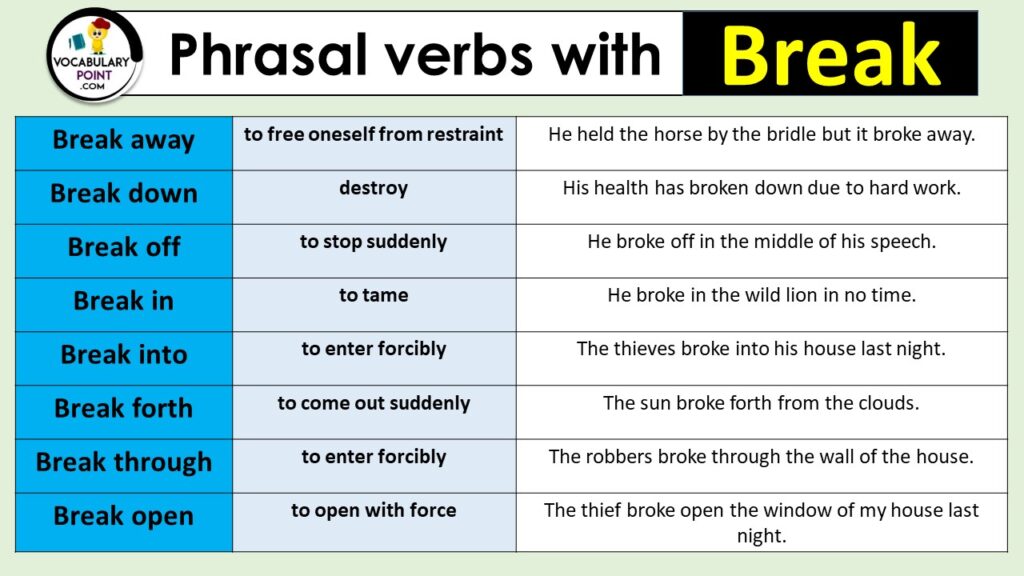


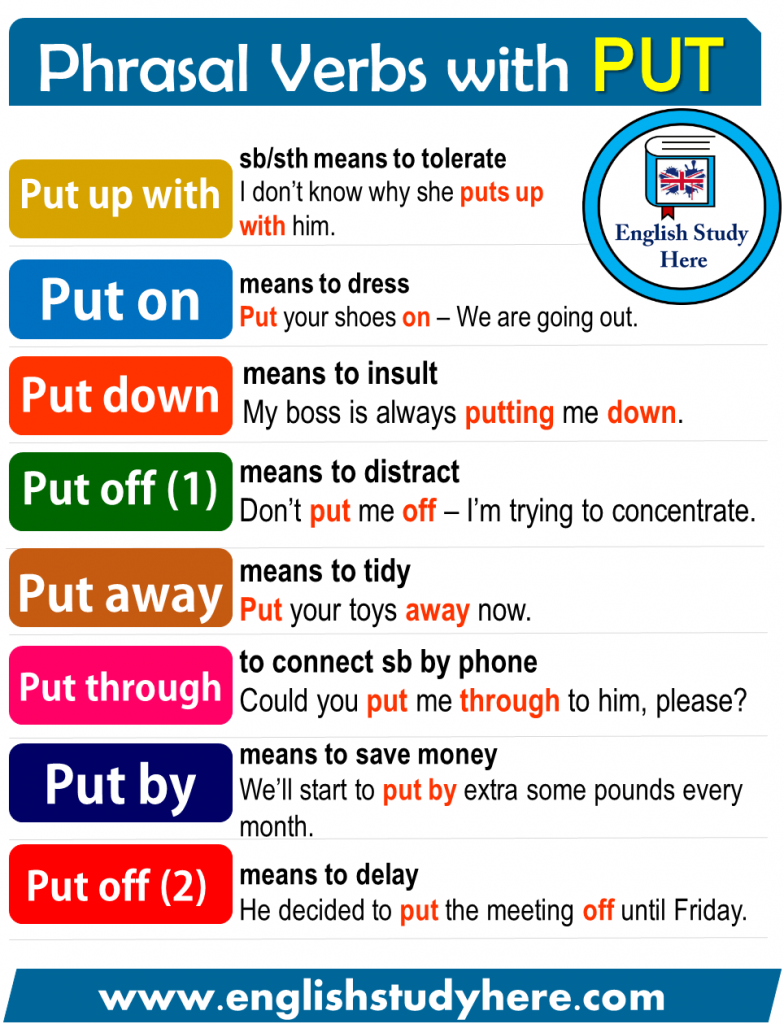

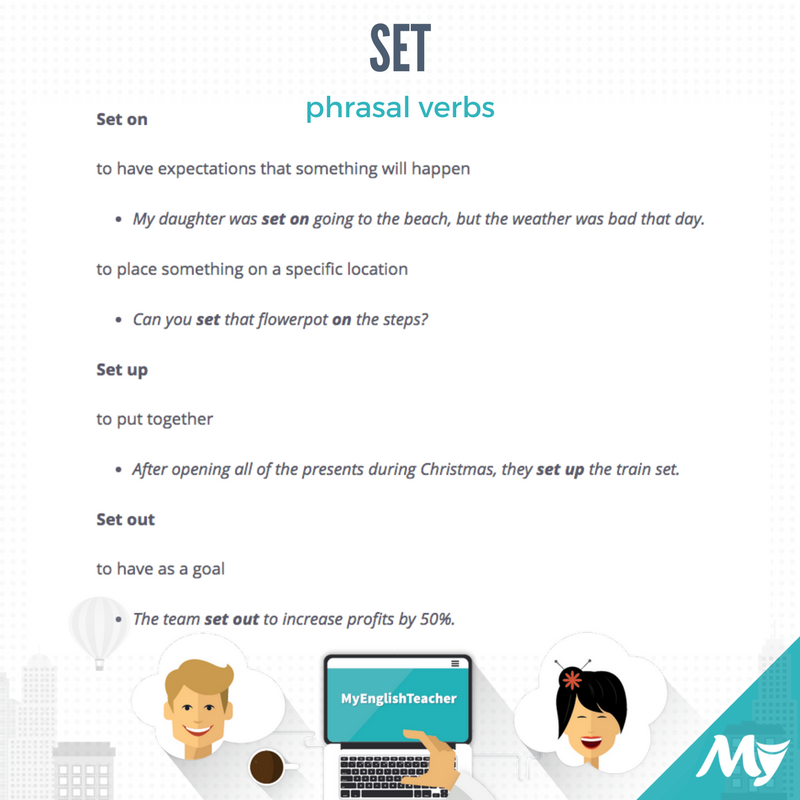
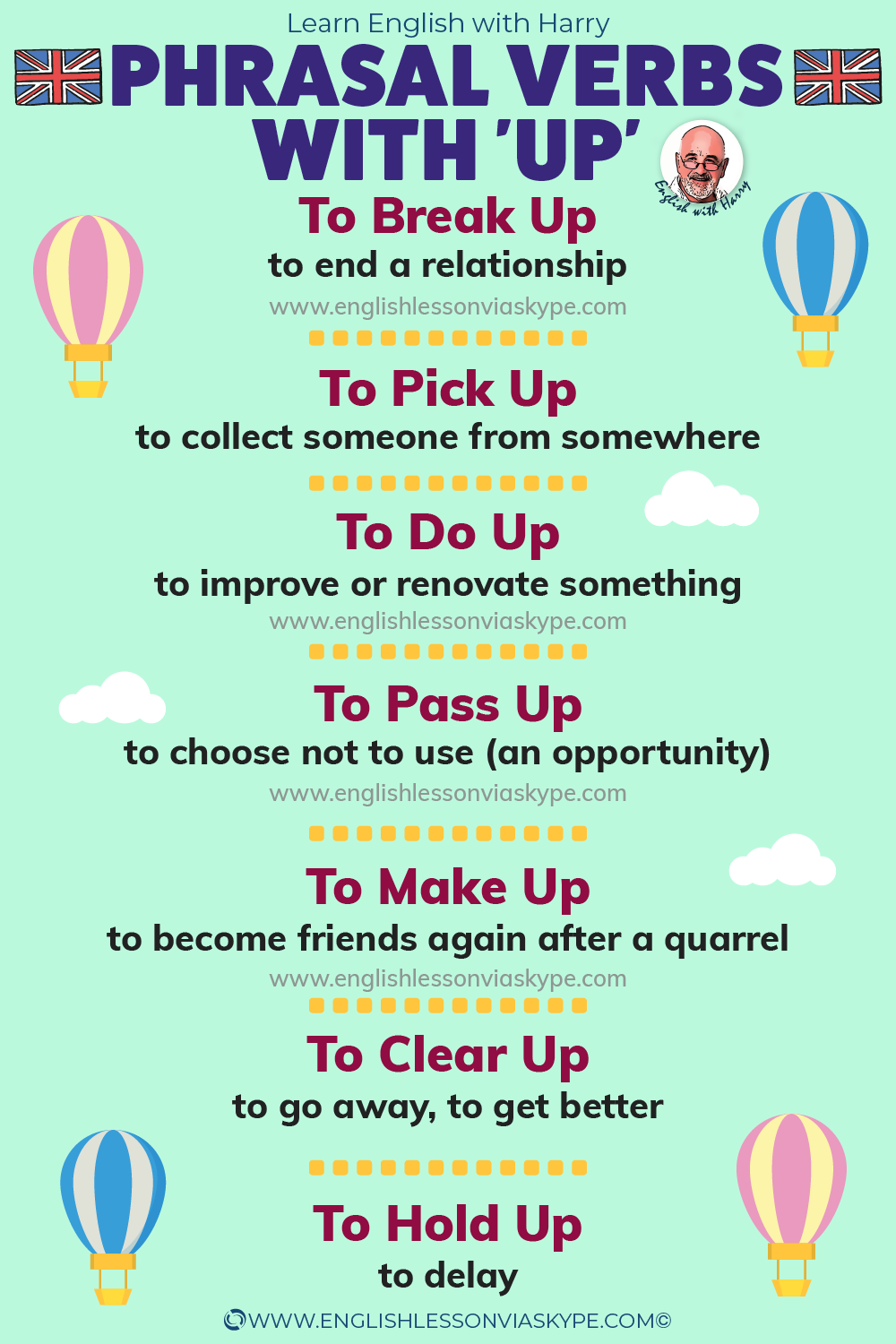








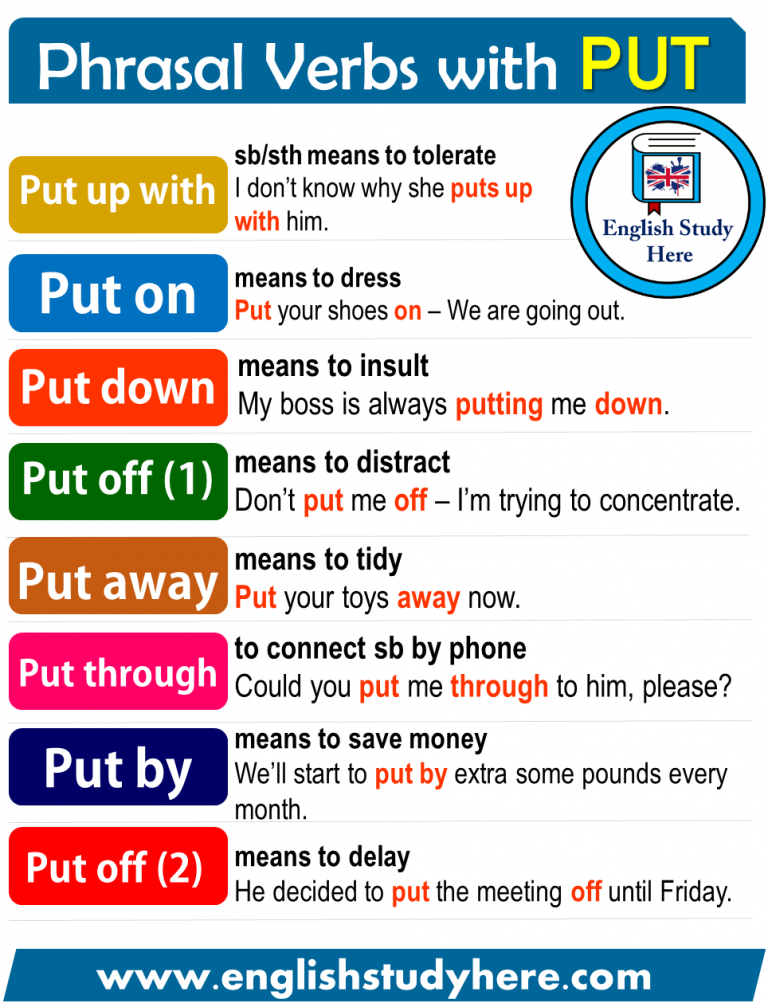



No comments:
Post a Comment
Note: Only a member of this blog may post a comment.